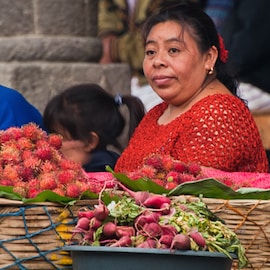Weekly Roundup: Keeping Talent, Seeking Another Uber, Auctioning Vegetables, Watching for Seagulls
Our collection of news articles, announcements, tweets, videos and other media that captured our attention over the course of the week.
Keep the talent happy (Keep the Talent Period)
There’s an emergency in social entrepreneurship that we’re simply not talking about enough: The talent dilemma. But Sal Giambanco, who heads up human capital at Omidyar Network, writes in Triple Pundit this week that the problem of talent recruitment and retention is real – and a recent study by Rippleworks, “The Human Capital Crisis: How Social Enterprises Can Find the Talent to Scale,” proves it.
“While hiring, developing and retaining the best people is challenging for nearly every business in every market, it is particularly difficult in emerging markets, where the talent gap is stifling social enterprises’ ability to scale,” Giambanco writes. “Fundraising may get all the attention, but while that gets easier for later-stage startups, human capital challenges grow tougher.”
He goes on to list a number of things that investors and executives need be doing to make their companies more attractive to not just high-end or entry-level job seekers. CEOs, for instance, would do well to have their “here’s why you should work here” pitch to job candidates as finely honed as their elevator pitch to investors.
Giambanco is to be commended for sounding the alarm on this subject – one we’ve posted on here and there, but nowhere near as much as we should. His is a clarion call that we all should be echoing.
Never say never on an Uber for healthcare
Two recent headlines about telemedicine come from two distinct worldviews: a TechCrunch opinion piece by Tom Valenti, “Why there will never be an Uber for healthcare,” and an AllAfrica story, “Apollo Hospitals and Airtel bring expert healthcare to Africa.” Valenti’s U.S.-centric question is, why try to Uberize health care when the sector’s biggest problem is simply a lack of face time between doctors and patients? He’s overlooking the possibility that the Uberization of health care might come from a developing country, and that it might target a real-world problem like preventable deaths due to the lack of basic health care information. It’s possible, in fact, that a solution might just come from the heavyweight alliance that led to the health app described in AllAfrica: Apollo pioneered private health care in India, while Airtel is the world’s third largest global telecommunications services company.
Report: @InsideNGO Amplify Impact Investing: The INGO Value Proposition for impact investing #socent #socinn #impinv pic.twitter.com/JaypQ46jWa
— Maximpact (@Maximpactdotcom) July 13, 2016
From Smallholder Farmer to WhatsApp Auctioneer
Africa’s entrepreneurial deficit, according to the global rankings, isn’t for a lack of hustle. Small businesses, be they formal or informal, are everywhere. What is lacking is the domino effect of business creation that generates more supporting businesses and, importantly, more employment. The Economist applies this macro view to some micro-businesses that have spun off from the efforts of TechnoServe, a business development NGO and long-time NB contributor. TechnoServe provided business training through its STRYDE project with Mastercard Foundation to several potato farmers in Kigali, Rwanda. Those farmers went on to form a cooperative to produce and sell seeds for higher-quality potatoes. And the commercial sprouts grew from there, writes The Economist in one of several powerful anecdotes:
“Emmanuel Bunani used his winnings to rent a plot of land to grow garlic for export. He now pays two people to work his fields and another three to shell and dry the garlic. He has also come up with a novel way of making sure he gets a good price from the traders he sells to: He has invited them all to a group on WhatsApp, a mobile phone chat service, and gets them to bid against one another when his crop is ready.”
We can do better than sunscreen-pooping seagulls
The news – and the sky, it seems – is full of drones. Faithful NextBillion readers already know that Rwanda earlier this month became the first country with a drone delivery network. The U.S. government, meanwhile, essentially grounded commercial delivery drones, starting next month, by setting weight limits and ruling they must remain within sight of their operators. Then came the story about the U.S. government trying to save endangered ferrets by lacing M&M’s with vaccine and shooting the candy into ferret habitat in Montana via specially equipped drones. As if that wasn’t bizarre enough, Nivea recently built a drone, for fun and advertising purposes, in the shape of a seagull that poops sunscreen on children on the beach. It’s fascinating to watch the technology evolve, but the recent stories seem to bear out what we’ve maintained all along: The highest use of drones might well be last-mile delivery of lifesaving supplies in developing countries.
In Case You Missed It … This Week On NextBillion
Summer of Impact Investing: ImpactAlpha Flags 10 Recent Developments Shaping the Sector
Getting Silicon Valley Behind Development: First, change its attitudes
Swine Flu Adds to Brazil’s Zika Worries
Equipping a New Era of Global Development
Top photo courtesy of The MasterCard Foundation.
Small photo courtesy of TechnoServe.
- Categories
- Health Care



